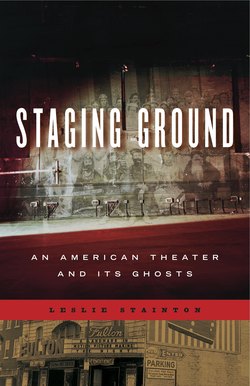Читать книгу Staging Ground - Leslie Stainton - Страница 12
На сайте Литреса книга снята с продажи.
ОглавлениеPROLOGUE: 1961
One Christmas morning I came downstairs in my pajamas and found a pink plastic showboat waiting for me under the tree. The boat was small but ornate, with a waterwheel at one end and shallow bas-relief railings at the other. Along the length of one side, the exterior wall had been cut away, like an anatomical model, except that instead of intestines and lungs this opening revealed a drawing room with a cardboard stage set.
I was six and knew already that I loved the theater. With my finger I traced the outline of the proscenium and touched the stage floor. Somewhere behind me, my father switched on the floodlights and began filming me and my brother and sister, as he did every Christmas morning. Stacked neatly inside the box that had come with the showboat were tiny cardboard flats, props, pieces of furniture, lights, figures on plastic stands. There was a complete cast of Heidi, including the Alm-Uncle and Clara in her wheelchair. There were mountain goats and a miniature tea service.
My father, still filming, drifted into view on my right and gestured for me to play. I picked up a character from the box and lowered her onto the stage through an open slot in the top of the showboat. I found another character. Soon I had them bobbing back and forth on their circular stands and jabbering. “Good,” my father mouthed, and gave me a thumbs-up. The camera clattered as the reel of film unspooled. I’d tried to understand how the machine caught and preserved our movements in a long sequence of frames, but I couldn’t grasp it. In the artificial glow of that Christmas morning, my cardboard actors were more real. They cast long shadows onto the stage. Back and forth they went, talking and arguing, making exits and entrances. I added a footstool and a chaise. A maid sailed down into the room in my hands to ask if anyone wanted supper. Long after my father had shut down his camera and turned off the floodlights, I went on playing.
The word itself was thrilling. Play. I’d seen a real one a year earlier in Philadelphia when my Aunt Betty had taken me to The Sound of Music for my birthday. The show had just opened, and we had front-row seats. Everything inside the theater glowed: the walls, the gold trim along the edges of the balconies, the lights at the base of the aisle seats, the playbill itself, which I’ve kept to this day. The curtain lifted, and I saw dozens of nuns at prayer in a chapel that stretched to the top of the proscenium and beyond. Someone, I couldn’t imagine who, had built a glittering rood screen behind which the women in their dark habits seemed to float. I was besotted. At intermission the curtain dropped and to my disappointment veiled whatever was taking place onstage. I leaned across the railing of the orchestra pit to get a closer look. From somewhere below me, a cellist reached up and tapped my elbow with his bow. I looked down; he smiled. Perhaps he said something, I don’t remember. What I wanted him to say was, “Follow me. I’ll take you to the other side.”
